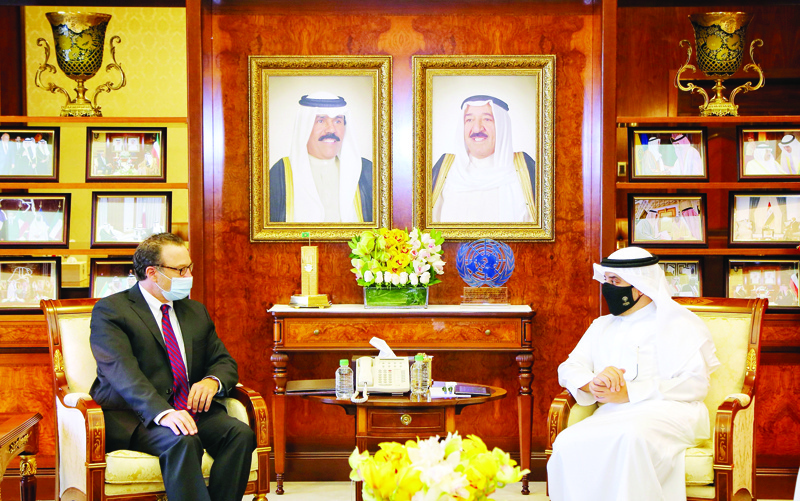
By Shakir Reshamwala
KUWAIT: A US official yesterday denied his visit to Kuwait was part of moves by Washington to pressure Kuwait to follow in the footsteps of the United Arab Emirates and normalize ties with Israel. Speaking to reporters during a virtual press conference, US Assistant Secretary of State for Near Eastern Affairs David Schenker said there are different views on the Israel-UAE peace agreement in the region, particularly in the Gulf.
"The UAE has deemed it is in their economic and strategic interests to have ties with Israel, which will benefit the state and the public. There will be states that share similar sentiments. This is nothing new - we have seen Israeli trade offices in the Gulf, we have seen other types of relationships. Whether they are formalized or not, we will see other developments," he said.
Schenker added the US views normalization of ties between the UAE and Israel as something positive. "The UAE believes there will be increased trade, economic and security cooperation with Israel vis-a-vis Iran. It will benefit not only the UAE, but the entire region including Kuwait," he argued, on the eve of Israel's first commercial flight to the UAE, which will carry a US-Israeli delegation led on the American side by US President Donald Trump's son-in-law and senior adviser Jared Kushner.
Schenker however refused to comment on statements made by Kushner earlier this month, when he said Kuwait was taking a "very radical" view on the Middle East conflict "in favor of Palestinians". Schenker also denied the recent flurry of diplomatic efforts is connected to the upcoming US presidential election.
On the Qatar-Gulf rift, Schenker said the schism has proved extraordinarily difficult to resolve and "undermines all our interests in the region". "It is a distraction from the threat posed by Iran in the region. We have been working at the State Department, the White House and even at the presidential level to resolve the crisis. It is a deep-seated difference that is ideological, there are differing viewpoints on domestic and foreign policy issues and the media and we are working hard to find a solution, but it has proven elusive," he said.
"The rift has only compounded current challenges in the region, and is openly putting money in the pocket of Iran, which is collecting overflight fees from the region," Schenker warned, commending HH the Amir Sheikh Sabah Al-Ahmad Al-Jaber Al-Sabah and the leadership of Kuwait for working tirelessly to reach a solution to the crisis.
On the US push to maintain an arms embargo and restore broader UN sanctions on Iran, Schenker appreciated the support of Kuwait and Gulf partners at the UN Security Council. The US suffered a defeat at the Security Council earlier this month when it failed to muster support for a resolution to extend the conventional arms embargo on Iran.
"We are disappointed Russia and China stopped the proposal from moving forward. If this arms embargo is not renewed, Iran will be in a position to proliferate weapons more easily, such as to Hezbollah, the Houthis and Iran-backed Shiite militias in Iraq. In any event, I would like to thank the government of Kuwait for supporting us," he said.
Schenker earlier met Foreign Minister Sheikh Ahmad Nasser Al-Mohammad Al-Sabah at the foreign ministry. The two officials discussed the "historic and solid" relationship between Kuwait and the US and latest regional and international developments, the foreign ministry said in a statement.
Schenker also met National Assembly Speaker Marzouq Al-Ghanem and the American Chamber of Commerce to discuss Gulf unity, regional security and economic cooperation. From Kuwait, Schenker heads to Qatar and Lebanon. Last week, US Secretary of State Mike Pompeo visited Bahrain, Israel, Oman, Sudan and the UAE during a regional tour.











